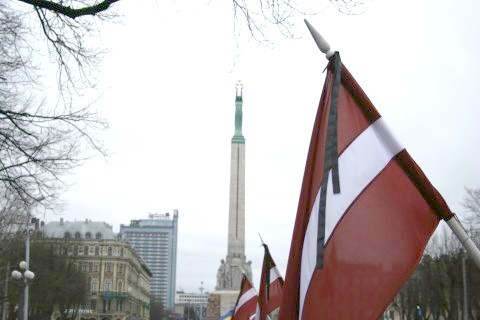Several commemorative events and concerts will take place all over Latvia today, Mach 25, honoring the thousands of Latvian citizens deported to Siberia on this date in 1949. The deportations are classified as crimes against humanity.
At 11 a.m., the Riga Latgale District's Association of Politically Repressed Persons will organize a memorial event at one of the railway stations - Šķirotava, where the deportees were forced into cattle train cars at gunpoint.
The traditional procession from the Museum of Occupation at 12:30 p.m. to the Freedom Monument will be followed by a flower laying ceremony at 1:00 p.m. at the base of the monument. Following the flower laying ceremony, participants in the event will be addressed by President Andris Bērziņš. State officials, National Armed Forces commanders, representatives from the Estonian and Lithuanian associations in Latvia and foreign ambassadors will also participate in the ceremony.
Various special concerts will also be held in the evening at the Small Guild Hall, the Riga Cathedral, as well as at the Edvards Smiļģis Museum.
Historians call the 1949 deportations to Siberia one of the most tragic days in the modern history of Latvia.
A declared neutral country during the early phases of World War II, Latvia fell prey to the realpolitik of both Nazi Germany and Communist Soviet Union, who concluded a Non-Aggression Treaty on August 23, 1939, known as the Molotov–Ribbentrop Pact.
The Pact allowed Germany to invade Poland on September 1, 1939. Among its secret provisions was the establishment of a Soviet Sphere of Influence in Eastern Europe, which included Latvia and allowed the Soviet Union under various pretexts to invade Latvia on June 17, 1940, and annex the country on August 5, 1940. The illegal takeover was never recognized de jure by major Western powers.
Immediately after establishing its rule through its collaborators and proxies, the Soviets began deporting the elites to the Soviet Union, culminating in the mass deportation on June 14, 1941, of more than 15,000 people. After the Nazi German occupation from 1941 to 1944/45, the USSR reoccupied Latvia and applied harsh measures to punish the people for alleged collaboration with the enemy and resisting Soviet occupation. A second mass deportation on March 25, 1949, effectively ended armed resistance against the occupation regime.
The Mass Deportation on March 25, 1949, of more than 42,000 people was carried out to end the resistance to collectivization of the farms and at the same time to get rid of the supporters of national partisans. This deportation was mainly directed against the farming population and entire families were sent to forced settlement areas for life. After Stalin's death, many were eventually allowed to return, but they could not resume their previous lives and were treated as unreliables.
The deportation began in the night of March 24. At night, people were arrested at home, during the day at their places of employment. Schoolchildren were sometimes taken to the trains directly from school. Families were sent to Siberia in cattle train cars unsuited for people, the cars were overcrowded and without any facilities.
Many of the deportees died on their way to the exile destination, others spent long and difficult years in the northern regions of Russia, fighting for their survival in inhumane conditions.
Between March 25 and March 28, 42,133 people or more than 2% of the pre-war population of Latvia, were deported from Latvia to places of "special settlement" (mainly in the districts of Krasnoyarsk, Amur, Irkustsk, Omsk, Tomsk and Novosibirsk). Among these were more than 10,990 children and youths under 16. Women and children under 16 constituted 73% of the deportees. Altogether 30,620 families and 94,799 people were deported from the three Baltic States.
March 25 in Latvia: Commemoration of the Brutal 1949 Deportations Latvia EU (2)
Rahvusvahelised uudised | 24 Mar 2020 | EWR
Viimased kommentaarid
Kommentaarid on kirjutatud EWR lugejate poolt. Nende sisu ei pruugi ühtida EWR toimetuse seisukohtadega.
Eesti okupatsiooniohvrite memoriaali avamisel nagu ei olnudki EL esindust...
Ja frau Merkel räägib solidaarsusest... mitte eurooplaste "pagulaste" puhul...
Ja frau Merkel räägib solidaarsusest... mitte eurooplaste "pagulaste" puhul...
Rahvusvahelised uudised
TRENDING

























